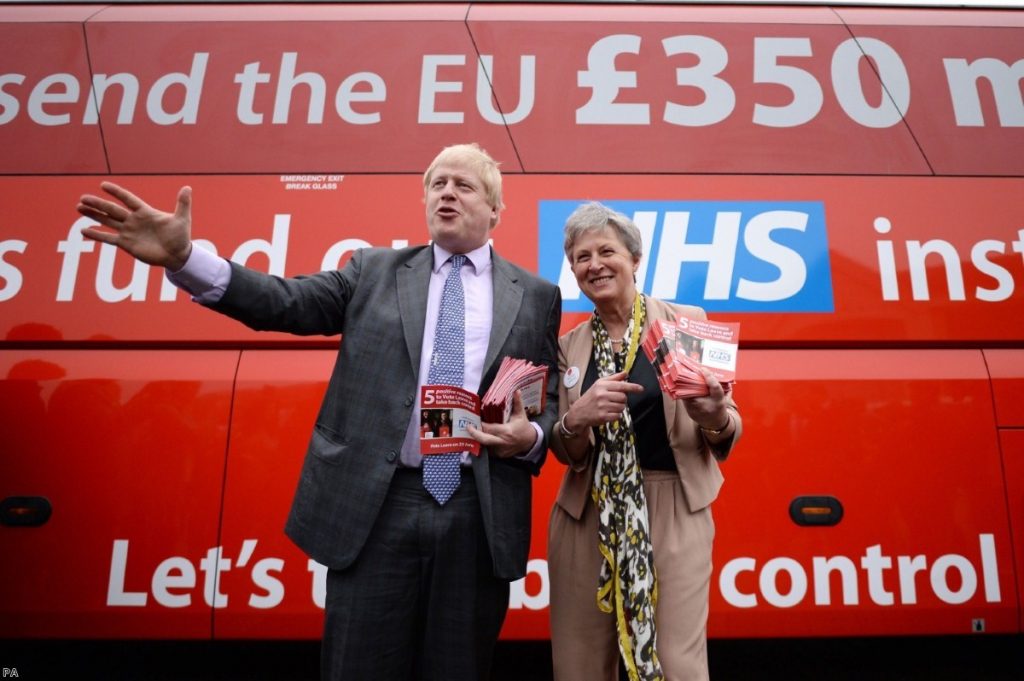What grim pleasures Brexit offers. This week it'll give us a series of speeches by Cabinet ministers laying out their vision for Britain outside the EU, a kind of choose-your-own-adventure book in which you decide which of the warring factions should go through to the final round.
Boris Johnson's offering comes tomorrow, but previews of it are in the press today. The foreign secretary apparently wants to bring Remainers and Leavers together in a vision of a 'liberal Brexit'. He even takes John Stuart Mills' name in vain by recruiting him for the Leave cause.
You can just about make an argument for liberalism and Brexit if you support staying in the single market and customs union, where goods and people still flow freely. But that is not the Brexit we're getting. We're getting reactionary Brexit. It is defined by a love for – even a fetishisation of – borders. It is the single greatest victory for illiberalism in the modern British period.
The debate is about borders for goods, borders for services, and borders for people. It is also, in its way, about the borders between people. In almost every area you look at, it blocks movement. That is its key attribute: an obstacle to the individual's right to travel or trade freely.


Goods which would once have crossed a border without anyone checking them will now have officials stop and inspect them. Brexiters might say they do not want this to happen, but it doesn't matter. It will happen, because they are dismantling the political and legal structures which allowed it to take place.
People who used to sell their services – be it consultancy or financial advice – in one country will be unable to do so in another. British air lines which would have once flown flights between two foreign European countries will be blocked from doing so.
But the real brute reality of borders will impinge most harshly on people.
The immigration system is a grotesque illiberal intrusion into the private life of individuals. People who fall in love are kept separate by the state because one of them does not earn enough money. Children are forced to grow up without a parent. A traveller going from one place to another is stopped by immigration officials and interrogated about their reasons for doing so. People who have left their passport with the Home Office for a visa are often deprived of it for years while the process trundles on, effectively barring them from leaving the country, even on holiday. People working in the UK are unable to bring over their frail parents or grandparents to live with them so they can care for them. They are left to choose between their careers and caring for their loved ones in their final days. British citizens born in this country are barred from bringing over family members for funerals or weddings. Victims of crime avoid the police because they know they can be detained due to their status, so are effectively denied security. EU citizens uncertain of how their eventual status will shake out are forced to sit around waiting for more information, but in the meantime dare not leave the UK for fear of being omitted from some future visa category.

Every day, millions of people living all around you suffer the restrictions and humiliations of immigration law. No-one ever tells their story.
We all know why. There is long-held and demonstrable public support for greater controls on immigration. People are weary of sudden demographic change in their community. Immigration is the prism through which they kick back against a sense of powerlessness and flux. If immigrants work, they reduce wages. If they don't, they use benefits. Regardless of whether they work or not, their cultures and foreign languages alienate the people around them. We are now expected to be less foreign, less exotic, less different. Nigel Farage's hatred of foreign languages on the train has been adopted as the instinctive intellectual assumption of our age.
Anyone who does not sign up to these arguments, anyone who refuses to give up thinking about and sympathising with immigrants is written off, with cruel irony, as an 'elitist'. Most people in the political class who privately sympathise with immigrants try not to mention it.
The refusal to do so has real consequences. Immigrants, who are mostly not in the political class, are left with no defenders. They must be daily smeared, libelled, sneered at and dismissed, with no voice to speak for their interests or their dignity.
John Stuart Mill, who Johnson is apparently so fond of, had a phrase for this: The tyranny of the majority.
Brexit often gets weighed down in obscure battles over customs and and court jurisdiction and trading regimes. But at its heart it is a philosophical struggle over nothing less than the freedom of the individual to move, without the state telling them what they can or cannot do. Brexit is a last-gasp authoritarian rebellion against the increasingly globalised nature of the world, a rejection of the increased fluidity which has come from new technology, cheap travel and multiculturalism.
This is the new political establishment. It is one that goes against the core tenets of liberalism, the direction of history and our own better instincts. That is why, no matter how many desperate speeches Johnson makes, it will continue to be opposed by those who understand that their way of life, and their vision of what a good life entails, are under threat.
As John Stuart Mill said: "In this age, the mere example of non-conformity, the mere refusal to bend the knee to custom, is itself a service."
Ian Dunt is editor of Politics.co.uk and the author of Brexit: What The Hell Happens Now?
The opinions in politics.co.uk's Comment and Analysis section are those of the author and are no reflection of the views of the website or its owners.












